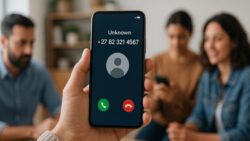South Africa Lookup Tool – WhosApp’s smart number lookup is built for South African users who want instant clarity before answering unknown calls. Instead of guessing who’s on the line, you paste or type a number and get crowd-sourced flags, reported behaviors, and community notes that help you decide whether to answer, block, or report. This approach gives you control in a landscape where phone fraud keeps evolving through tactics like SIM-swap, vishing, and robocalls. If a number has been linked to fake prize draws, aggressive sales, or phishing attempts, you’ll see those patterns right away so you can avoid risk. You can also add your own report to warn others, building a safer caller ecosystem. And because personal data matters, WhosApp focuses on identifying suspicious activity tied to numbers, not exposing your private details. The goal is simple: help you protect your time, money, and peace of mind with an easy, fast, and reliable lookup made for South Africa’s realities.

 Trace Any South African Number and Instantly Know Who’s Calling With WhosApp’s Smart Lookup
Trace Any South African Number and Instantly Know Who’s Calling With WhosApp’s Smart Lookup
Why Number Lookup Matters In South Africa
Across South Africa, criminals increasingly blend calls and SMS to steal information or push payment scams. Tactics include caller-ID spoofing, SIM-swap fraud, and voice phishing (vishing) where impostors pretend to be bank staff or service agents. Staying ahead means verifying unknown numbers before you engage. If you spot a pattern—multiple missed calls, urgent threats, or “account blocked” messages—use WhosApp to check recent community reports in seconds. If a number is suspicious, rather escalate safely: consult your bank’s fraud desk and industry advisories from credible sources such as the South African Banking Risk Information Centre on SIM-swap awareness at SABRIC and guidance on voice phishing via the Ombudsman for Banking Services at OBSSA. If money is at risk, open a case with the South African Police Service at SAPS. These steps—verify, document, and report—significantly reduce exposure to evolving phone-based fraud.
How WhosApp’s Smart Lookup Works—And How It Respects Your Privacy
When you search a number on WhosApp, you see public-facing insights: tags like “telemarketing,” “loan scam,” “delivery scam,” or “phishing,” plus user comments that describe how the caller behaved. That context helps you decide whether to pick up, call back, block, or report to authorities. Because privacy is essential, WhosApp aligns its approach with South Africa’s data-protection principles under POPIA; for authoritative guidance, review the Information Regulator’s materials at Information Regulator (POPIA). For unwanted marketing, you can also raise complaints with mobile content regulators such as the Wireless Application Service Providers’ Association at WASPA Complaints, and, when appropriate, log telecom service complaints or consumer issues guided by the communications authority at ICASA. Our aim is to help you act quickly, share accurate flags with others, and keep your personal details protected while you fight spam and scams effectively.
Practical Red Flags: Spot Scams Before They Cost You
Scammers rely on urgency and fear. Be cautious if a caller demands immediate payment, requests your OTP, or insists on “remote verification” of your banking app. Real banks do not ask for PINs or OTPs over the phone; confirm this with industry education via SABRIC and banking-dispute guidance via OBSSA. Another common trick is delivery or customs scams that claim a small “release fee”—use WhosApp’s lookup to see if others recently reported the same script from that number. If you believe your identity may be compromised, consider Protective Registration with the South African Fraud Prevention Service at SAFPS; it alerts member institutions to verify applications made in your name. For spam SMS linked to mobile content, submit a clear complaint with call/SMS evidence through WASPA, and keep screenshots for any SAPS case you might open at SAPS if the matter escalates to fraud.
Turn Verification Into A Habit: Safer Calls At Home And Work
Build a routine: when an unknown number rings, run it through WhosApp first. If it’s a business you know, call back using the official number on their website or your bank card instead of returning the missed call. If it’s pushy marketing, block and, where appropriate, raise a complaint with WASPA. For continual awareness, read consumer guidance from ICASA and privacy updates from the Information Regulator so you understand your rights under POPIA. If you suspect account risk—strange notifications, SIM issues, or port-out attempts—contact your bank and mobile provider immediately, and review anti-fraud tips at SABRIC. Most importantly, contribute back: add your WhosApp report after a suspicious call. Your one note can help thousands of South Africans avoid the same trap, making our shared caller ID ecosystem stronger, safer, and more transparent every day.







